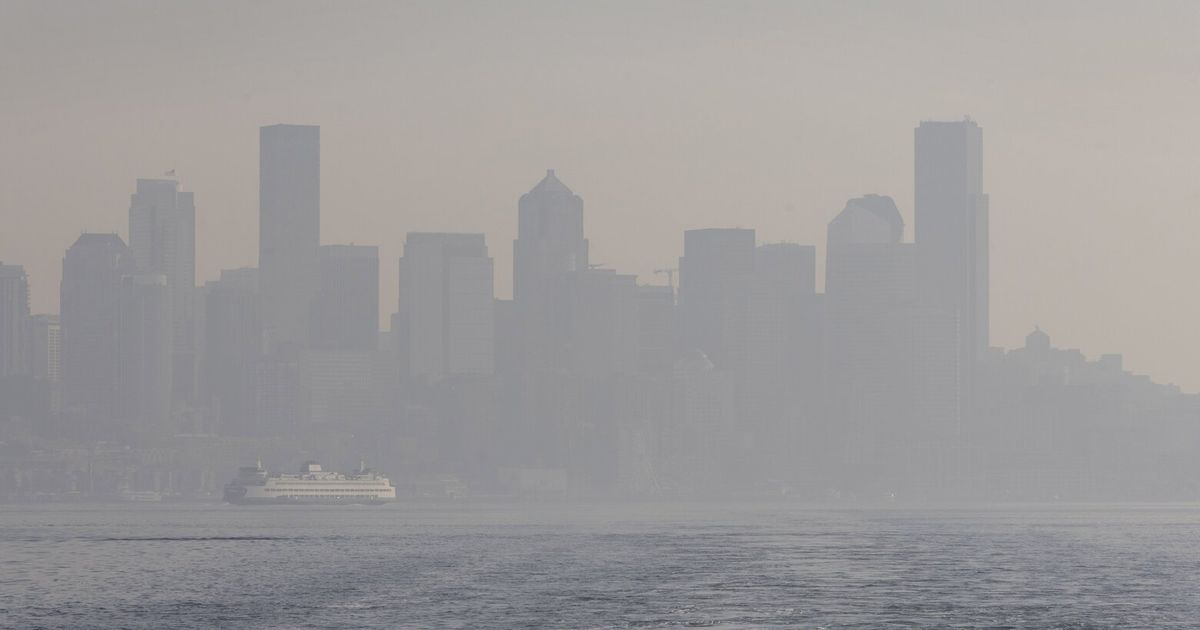
If you’re having trouble believing it’s really mid-October, you’re not alone.
Between the unseasonably warm and smoky weather, and postseason baseball at T-Mobile Park, this weekend will be nearly unrecognizable in Seattle.
But the August-like smoke could impact the Mariners, Seahawks and Huskies along with the thousands of fans expected to turn out for the three major sporting events Saturday and Sunday.
While the region continues to battle active fires in the Cascade Mountains, the Seattle area has been socked with another round of haze, and air quality has deteriorated. On Friday air quality in the region reached “unhealthy” levels, with an Air Quality Index (AQI) reading of 152, according to AirNow, home of the U.S. Air Quality Index.
The smoky conditions are expected to worsen this weekend, said Dev McMillian, a meteorologist with the National Weather Service in Seattle.
“This weekend we’re looking to see conditions deteriorate,” McMillian said. “The smoke will definitely increase across Western Washington. [Saturday] we’ll see Easterly winds begin to pick up, and smoke will begin to disperse across the area. Saturday and Sunday does not seem favorable at all in terms of air quality.”
An air-quality alert will go into effect at 5 p.m. Friday for King County that is expected to last until 11 a.m. Monday. Weekend temperatures are expected to jump into the upper 70s and could touch 80 on Sunday.
The alert states that “all sensitive groups should limit spending any time outdoors. People with health conditions may have worsened symptoms. Healthy people may start to have symptoms,” according to the alert.
Some improvement is expected by Monday, but the forecast is potentially concerning for a major weekend of Seattle sports. The Mariners, Seahawks and Huskies all host games outdoors this weekend, with thousands of fans expected at each event.
As of Friday, all games are expected to go on as scheduled, but each of the three teams say they are monitoring the situation closely.
The Mariners are scheduled to face Houston on Saturday at 1:07 p.m. at T-Mobile Park in Game 3 of the American League Division Series and would play Sunday at 12:07 p.m. if they win to extend the series.
The teams along with MLB officials will work with independent weather experts, medical experts and with the MLB Players Association to determine whether the conditions are playable. The Mariners are not expecting the air quality to reach the threshold for affecting the game, a team source said. The Mariners relocated a home series with the Padres to San Diego in September 2020 due to poor air quality caused by smoke.
The UW football team faces Arizona at Husky Stadium at 2:30 p.m. Saturday and will use AQI instruments on the sideline to monitor conditions. The game could be affected if AQI levels hit 200 for a prolonged period, a UW spokesperson said.
The Seahawks are scheduled to play the Arizona Cardinals at Lumen Field at 1:05 p.m. Sunday. (The game will move to 2:30 p.m. if the Mariners are playing.) Team officials said they are keeping a close eye on the conditions and plan to follow the NFL’s guidelines for playing in unhealthy conditions.
The league has stated that an AQI of 200 or higher could affect games, but the league weighs other factors including particulate-matter levels.
According to the NFL’s game-operations manual, the league will monitor AirNow.gov, which provides real-time AQI data. The NFL says it will work closely with the home club and local authorities and will be prepared to relocate a game “if there is definitive evidence that the AQI will remain consistently above 200 for a significant period of time, including the day of the game being played in the affected stadium.”
The air quality isn’t just a concern for athletes, as fans could face health effects from sustained time outdoors.
“While some parts of the state are experiencing unhealthy levels of air quality, we’re also worried about the impacts of lower levels of smoke for extended periods of time,” Kaitlyn Kelly, air-quality policy specialist for the state Department of Health, said in a statement to The Times this week. “Don’t wait until you start feeling symptoms to act.”
Seattle Times reporters Ryan Divish, Bob Condotta and Mike Vorel contributed to this report.